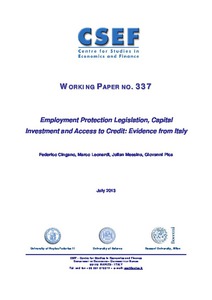Employment protection legislation, capital investment and access to credit: evidence from Italy
"Employment protection may affect both productivity and capital investment because higher adjustments costs hamper allocative efficiency and may therefore affect both the optimal capital labor input mix and total factor productivity. To estimate the impact of dismissal costs on capital deepenin...
| Main Authors: | , , , |
|---|---|
| Institution: | ETUI-European Trade Union Institute |
| Format: | TEXT |
| Language: | English |
| Published: |
Naples
2013
CESEF |
| Subjects: | |
| Online Access: | https://www.labourline.org/KENTIKA-19124744124919429269-employment-protection-legislat.htm |
| Summary: | "Employment protection may affect both productivity and capital investment because higher adjustments costs hamper allocative efficiency and may therefore affect both the optimal capital labor input mix and total factor productivity. To estimate the impact of dismissal costs on capital deepening and productivity we exploit a reform that introduced unjust-dismissal costs in Italy for firms below 15 employees, leaving firing costs unchanged for bigger firms. We provide evidence that the increase in firing costs induced capital deepening and a decline in total factor productivity in small firms relative to larger firms after the reform. We also find that capital deepening is more pronounced at the low-end of the capital distribution – where the reform arguably hit harder – and among firms endowed with a larger amount of liquid resources, that have more room to react thanks to an easier access to the credit market. Our results also indicate that the EPL reform reduced the probability to access the credit market, possbily because stricter EPL reduces both the value of the firm and the amount of internal resources that the firm can pledge as collateral against lenders." |
|---|---|
| Physical Description: | 27 p. Digital |

